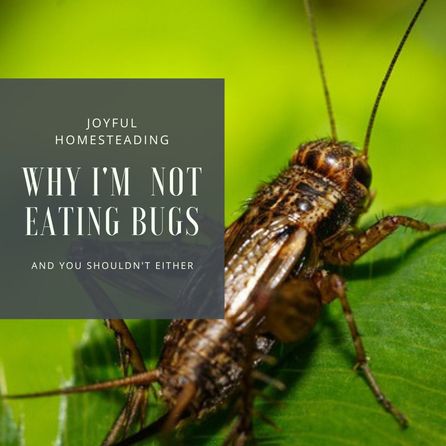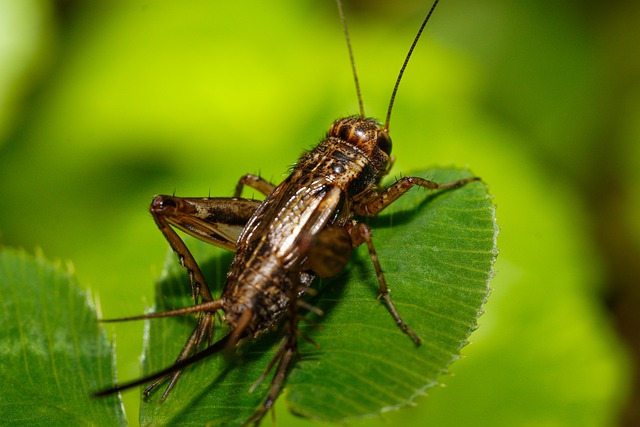The Dangers of Eating Crickets
Know the dangers of eating crickets and other insects before following this fad that's being pushed by celebrities and elitists. A notion is being foisted upon us that we can save the environment by eating crickets and mealworms, but a steady diet of these insects can unleash a number of health issues including allergies, inflammation and asthma.
The media is touting insects as a food that can save the environment, but growing chickens in a backyard is equally environmentally friendly and much better for your health.

The Dangers of Eating Crickets Include a Less Than Stellar Source of Protein
Celebrities are touting this new fad, claiming insects are a great source of protein. They're not. Cricket Bites claim to have 6 grams of protein in one package.
Eating a 3-ounce serving of chicken will provide you with a whopping 27 grams of protein as opposed to that measly 6 grams from crickets. Chickens who live in your backyard produce very little methane gas, meaning they’re environmentally friendly. So why aren’t celebrities touting chicken and suggesting everyone keep a few hens on their property?
But I digress. Watch while Nicole Kidman eats hornworms, mealworms, and crickets while throwing an occasional wink at the camera.
Ironman, Robert Downey Jr, was recently promoting insect protein powder on Stephen Colbert. Again, he argued that insects are an environmentally friendly way of consuming protein without showing any facts. We're just supposed to trust him because he's a super hero on the silver screen.
The Dangers of Eating Crickets Include Inflammation and Allergic Reactions
An author on Substack, the 2nd Smartest Guy in the World, recently posted a disturbing article on the dangers of eating crickets and other insects.
Insects have an exoskeleton (meaning their bones are on the outside of their bodies). One important element of those exoskeletons is chitin. Not only is chitin toxic to humans but it can also make your immune system go haywire and cause inflammation.
According to a study done in 2018, humans can’t synthesize chitin. Consuming the proteins in chitin over a long period of time can cause tissue damage and deficiencies in vitamins A and E. People need vitamin A for a healthy immune system. Vitamin E is crucial to eliminating the free radicals that damage the cells in your body.
The Dangers of Eating Crickets Include Exposure to Dangerous Parasites
Crickets can spread diseases, including parasites and salmonella. According to a study done in 2019, it was found that eating insects expose you to the risk of pathogenic parasites 30% of the time.
The Dangers of Eating Crickets Are Too Numerous To Be a Legitimate Protein
So why the sudden push to consume insects as a viable source of protein? The World Economic Forum recently posted an article arguing people should eat insects to save the environment.
With that article, they posted a chart comparing insects and the greenhouse gases they produce to chickens, pigs, and cattle. According to the chart, the greenhouse gases chickens produce are not available. This leads me to suspect that chickens either produce the same greenhouse gases per live weight as crickets or they produce even less.

If you're considering eating insects because you want to add protein to your diet, know that you have a wide range of choices that promote rather than harm your health.
How To Get Needed Protein While Avoiding the Dangers of Eating Crickets
For optimal health, you should include roughly 1.5 grams of protein for every pound of body weight. If you weigh 130 pounds, you need at least 19 and a half grams of protein per day.
One cup of cooked pinto beans has 15 grams of protein while a cup of cooked lentils provides you with 18 grams of protein. Half a cup of cottage cheese gives you 12 grams of protein. Two teaspoons of peanut butter give you about 7 grams. My point is you can get protein through a wide variety of sources that don't include eating bugs.
Having a Source of Protein on Hand in An Emergency
If you’re worried about not getting sufficient protein in your diet should the cow manure hit the box fan, start buying dried beans in bulk. Even in these crazy days of inflation, dried beans are still affordable.
Vacuum seal them, and they’ll last for years. Even if they’re old, you can still cook them and they’ll come out okay. Just add a teaspoon of baking soda in the cooking pot.
Don’t store your beans in plastic vacuum bags, as the taste of plastic will leach into your dried food. Store them in glass jars instead. If you can’t afford a vacuum sealer, then store your beans in a cool, dry place and rotate them. Always use the older food first. Cook with beans now so you build up a cache of recipes you enjoy.
And please, don't eat bugs.






New! Comments
Have your say about what you just read! Leave me a comment in the box below.